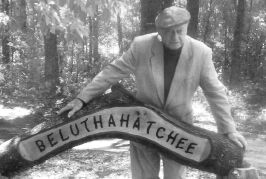Noted Florida author and folklorist Stetson Kennedy, best known for infiltrating the Ku Klux Klan in the 1940s, died August 27, 2011. Throughout his life, he worked as a vocal advocate for environmental causes, labor organizing, and human rights. In October 2013, UF Special Collections and SPOHP celebrated the donation of Kennedy’s personal papers to the University of Florida during the public program, “Stetson Kennedy: Re-Imagining Justice in the 21st Century.”
For a detailed biography of Stetson Kennedy, read his obituary by William Grimes in the New York Times, “Stetson Kennedy, Who Infiltrated and Exposed the Klan, Dies at 94” and visit the Stetson Kennedy Foundation.
Homage to Stetson Kennedy
by William DeGrove Carter for the Florida Coalition for Peace & Justice
Mr. DeGrove wrote for the Florida Coalition for Peace & Justice after Stetson Kennedy’s death in 2011.
When I was five years old and Stetson seven, my family moved into a house directly across the street from the Kennedy household. Our neighborhood was then in a sparsely populated area and I naturally became friendly with Stetson and the rest of the rest of his family.
Stetson and I shared a normal childhood, which included a love of fishing and boating in the nearby St. John’s River and occasionall hunting squirrels with his father. But all this idyllic life was soon to change. Later on, while in our teens, I became aware of the different attitude held by Stetson – as contrasted with that of his peers, including myself – with respect to the segregated world in which we lived. I, personally, knew no colored people, as our black citizens were then called, except our part time maid and a man who pumped gas at the local filling station. Although neither I nor my family were unkind to these individuals, we accepted their low economic and social status as the natural order of things. Not Stetson, who by campioning the rights of colored people and fostering union organization, incurred the enmity of local business leaders w ho wanted to keep the status quo because of their own selfish interests. Further, he was ostracized by members of his own family who were embarrassed by his fraternization with people below their social level.
I am not certain what awakened the strong desire in him to speak out against racial segregation and try to set things right. Perhaps it was the incident recently retold in a newspaper article in which the family’s black maid was raped and beaten by a Klansman for “sassing” a white trolly conductor; perhaps it was his experience of collecting fifty cents a week from poor blacks in payment for furniture bought from his father’s store; or perhaps it was having seen two black convict women pulling a plow guided by a third. In any case, Stetson developed a strong sense of social justice which has lasted a lifetime.
Apart from being ostracized by family, and many who had earlier been friends and now considered him “a deranged Communist,” he lived under threat of physical harm from the Klan and others who believed Stetson’s writings would ultimately jeopardize their economic interests. Rather than being deterred by the above, Stetson, to his credit, pushed even harder for racial equality and broadened his defense of the disadvantaged and disenfranchised. I am told his work in the Civil Rights Movement was notable and that his background and active participation in its goals lent stature to the Movement.
In my mind, Stetson Kennedy has done more thanany white man in teh South to better racial relations and end discrimination and injustice in the work place. In short, his lifelong efforts to give equal opportunity to all citizens of this country have made a difference and one of which he has every right to be proud.
Stet, I salute you and am delighted to learn that you have been chosen to receive this year’s Dr. Benjamin Spock Peacemaker Award.
Rather than being deterred . . . Stetson, to his credit, pushed even harder for racial equality and broadened his defense of the disadvantaged and disenfranchised.
-William D. Carter
Photo from the Stetson Kennedy Foundation. To learn more about folklife and oral history, contact SPOHP, call the offices at (352) 392-7168, and connect with us online today.
